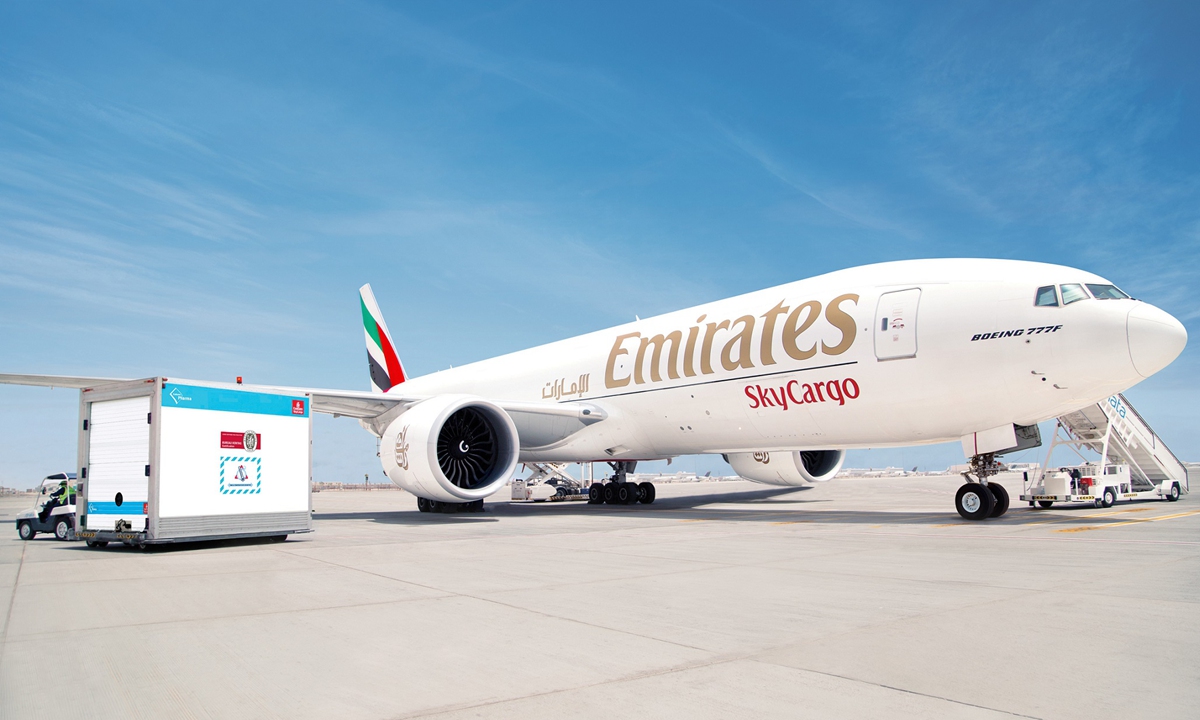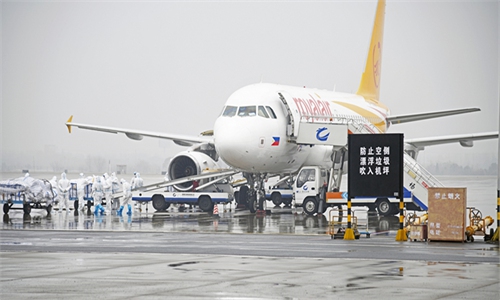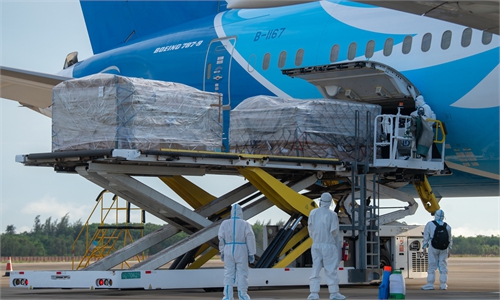China’s recovery poses opportunities for foreign cargo business
A stable market guarantees global supply chains

Emirates Photo: Courtesy of SkyCargo
The impact of the pandemic on the global aviation industry has been unprecedented. Data from International Air Transport Association (IATA) showed that global international passenger demand for 2020 was down 75.6 percent year-on-year. The air cargo market saw a massive reduction in capacity available due to restrictions placed on passenger flights.
However, demand for capacity to transport goods remained high. Emirates, for example, saw a 22 percent reduction in ton carried by its cargo division in the 2020-21 financial year, while its total revenue from cargo operations increased by 53 percent year-on-year.
Market watchers indicated that the short-term boom in the air cargo transportation market driven by the pandemic is not a decisive factor boosting the sustained growth of the industry. Instead, the balance between supply and demand remains a key to industry development in the long run, and foreign carriers' cargo business is supporting global economy which benefits from China's recovery.
Early recovery
"China is a vast market among our network, and our global network recovery is firstly started from China," Michael Qu, SkyCargo Manager of Emirates China, told the Global Times in an online interview on Wednesday.
He said starting from March of last year, its cargo routes from China were once increased dramatically, such as in one week, there were 18 cargo flights starting from Chinese mainland, increased from 10 weekly cargo flights before the pandemic. In comparison, at that time, a lot of countries were still in lockdown.
Emirates said it has barely stopped its cargo flight operations during the pandemic. By mid-February last year, Emirates had fully resumed scheduled cargo flights to Chinese mainland to transport medical supplies and goods between China and other countries. During the COVID-19 pandemic in 2020, 87 additional charter flights operated from Chinese mainland, on top of scheduled flights, with a total tonnage carried on these flights was close to 4,000 tons.
Currently, in addition to belly-hold cargo transport on passenger flights once weekly between Guangzhou and Dubai, the carrier is operating 13 weekly scheduled cargo flights to Guangzhou - four per week, Shanghai - eight weekly and Beijing once a week. These dedicated cargo flights are all operated using Boeing 777 freighters, with a cargo capacity of up to 100 tons per flight.
Emirates SkyCargo said it is in collaboration and agreement with responsible authorities to implement a range of measures to ensure the global flow of cargo, including adoption of passenger freighters, expanded use of charter flights, flexibility in bi-lateral and multi-lateral regulations, adaptation to new standards for operations, as well as well protection of its personnel.
Data from Emirates SkyCargo showed that it expanded its network to more than 100 scheduled cargo destinations across the world by July 2020, from just over 35 destinations at the end of March last year. Currently, it offers cargo capacity to over 140 destinations around the world.
Data from Civil Aviation Administration of China showed that currently there are nearly 3,700 international cargo flights taking off each week, up 257.5 percent on 2019 levels.
According to the July 2021 Air Cargo Market Analysis report recently published by IATA, global demand, measured in cargo ton-kilometers, was up 8.6 percent compared to July 2019. Overall growth remains strong compared to the long-term average growth trend of around 4.7 percent.
Key logistics routes
Goods transported by air are also a guide to China's growing importance among global supply chains.
In the early stages of the pandemic outbreak, border closures in various countries led to the suspension of almost all passenger flights globally, which resulted in a significant reduction in the belly-hold capacity of passenger flights for all airlines.
The widespread suspension of passenger flights and rapidly increased demand for the transportation of COVID-19 related equipment and supplies during the pandemic kept the demand for air cargo high. The interconnected nature of the global economy and the diversification of manufacturing and distribution supply chains also played a role in the continued demand for air cargo capacity.
Many airfreight vendors and clients claim the gap has been narrowed even further, with some ocean cargo shipments quoted at $20,000 or more. For several popular air freight routes, such as Shanghai to Europe, the rate was $4.08 per kilogram as of July 6, down more than 50 percent since May, according to FreightWaves, a logistics supply chain data provider.
"Although the COVID-19 pandemic brought a temporary setback, it is expected that the bilateral trade between UAE and China will continue to surge in the coming years as a result of the strong economic relations between the two nations, which will positively influence the air cargo industry", Qu said.
Emirates recently marked the one-year anniversary of passenger freighter operations of its SkyCargo operations in March 2021. Over 27,800 cargo-only flights were operated during the year, transporting more than 100,000 tons of essential supplies, including pharma and food on those flights.
As of the future, Qu said, the air freighter rate would probably decrease when the international passenger flights are recovered.
China's foreign trade maintained a relatively strong growth for the 14th consecutive month in July.
Total imports and exports in July grew 23.1 percent year-on-year to $508.74 billion, while trade during the first seven months of the year increased 35.1 percent to $3.3 trillion, according to the General Administration of Customs.


